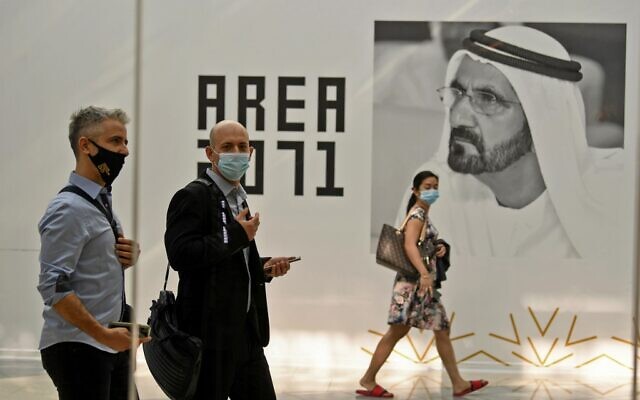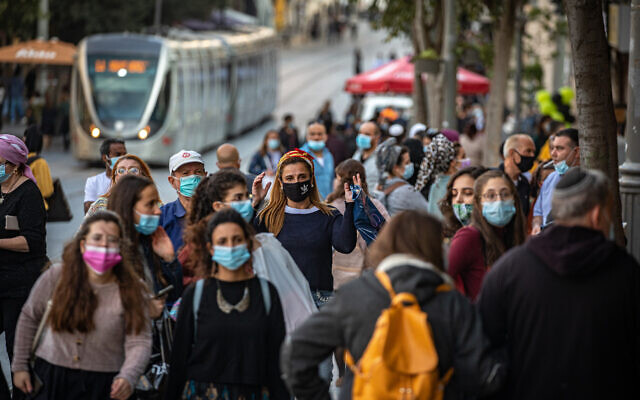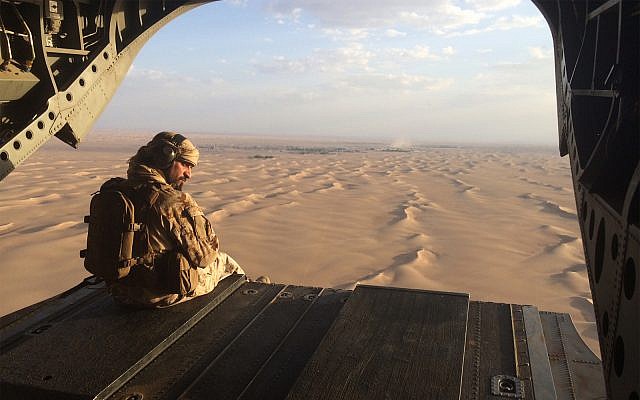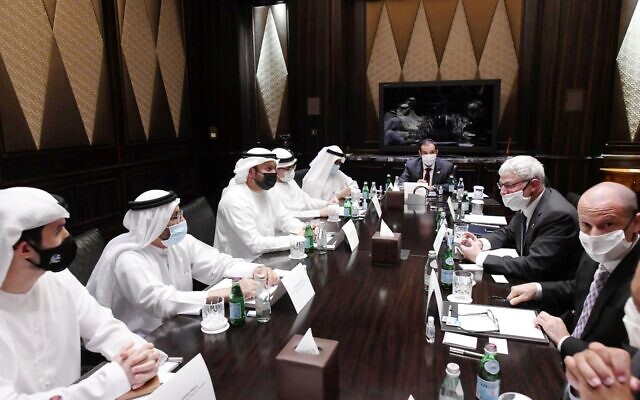The Friday Edition
Gulf normalization isn’t about fearing Iran, it’s about embracing Israel
ource: The Times of Israel
Published December 16, 2020
An off-the-record conversation between Emirati and Israeli officials reveals a deeper impulse for forging ties than the immediate benefits each country has won for itself

Israeli model May Tager, right, holds Israel's blue-and-white flag bearing the Star of David, while next to her Anastasia Bandarenka, a Dubai-based model originally from Russia, waves the Emirati flag, during a photo shoot in Dubai, United Arab Emirates, Sept. 8, 2020. (AP Photo/Kamran Jebreili)
“You think you have chutzpah? We have chutzpah.”
It was an unexpected line from a senior Emirati official, delivered recently in an off-the-record video conference call between current and former Israeli and Emirati officials.
The conversation had turned to business ties, innovation and the cultural differences between the two countries. The official wanted to explain something important about the new Israeli-Arab normalization agreements that Abu Dhabi had helped start: not only why they are happening, but why they seem so inexplicably warm and genuine.
The United Arab Emirates is most visible in this regard, but it isn’t the only one. Bahrain, too, is investing in a warm peace. And Sudan, while agonizing over the step itself — a breach of decades of ideological commitments vis-à-vis the Palestinians — has shown signs of wanting the normalization to reap more benefits than mere diplomatic contact or its removal from the US terror sponsors list.
There is no shortage of benefits that have accrued to the countries that normalized relations with Israel in the waning days of the Trump administration. The Emiratis asked for F-35s, the Moroccans recognition of their claim over Western Sahara, the Sudanese an end to their 27-year stay on the terror list and protection from lawsuits linked to the previous regime.

A protester against the normalization deal between Morocco and Israel in Rabat, Morocco, December 14, 2020. (AP Photo/Mosa’ab Elshamy)
These benefits all explain why each government might agree to establish full diplomatic ties with Israel. But they don’t explain, for example, the Emirati government’s order that hotels offer kosher food in time for the Jewish holiday of Sukkot, or the eagerness of the UAE and Bahrain for direct flights to Tel Aviv, or the decision by one sheikh to buy into Jerusalem’s controversial Beitar soccer club. They don’t explain Morocco’s move in recent weeks to introduce a curriculum about the history and culture of the country’s Jews into state school.
There are costs to that warmth. The Palestinians are furious not only at the opening of diplomatic relations — Egypt and Jordan already broke that taboo — but at what they see as a gratuitous embrace of Israel and Israelis. Iran, Muslim Brotherhood-linked regimes in Turkey and Qatar, and the opinions of many Arabs and Muslims from Morocco to Malaysia are against the move.
If Israel had the population or economy of, say, Germany, the economic factor might be sufficient explanation for the embrace. But it doesn’t. Israel’s population is roughly that of Honduras, its GDP roughly that of Ireland. Israeli tourists are not going to reshape Dubai’s economy, nor are Jewish pilgrims to heritage sites going to dramatically affect Morocco’s prosperity.
What, then, explains the apparent warmth of the new normalization? Where did this sudden show of affection come from?

DP World and Israeli Agrexco officials at the Fresh Market in Dubai, Nov. 2020 (DP World)
There are two explanations for the unexpected openness. The first is often heard from Israeli officials, who have generally assumed that the new friendliness is meant to head off criticism. It’s a basic rule of politics both domestic and international: If you’re going to do something controversial, you’ll catch less flak by leaning into it than by apologizing for it.
The Emiratis believe they can neutralize more Arab criticism by embracing a warm peace with Israelis than by keeping their distance, the argument goes.
But there is a second explanation for the new warmth, one suggested by the senior Emirati official to his Israeli colleagues in that call.
At a superficial level, it has to do with the countries’ shared interest in fending off Iran. But the new interest in Israel isn’t about a narrowly conceived defense pact, arms sales or intel sharing. It’s about self-reliance.

Members of an Israeli high-tech delegation walk past a poster of Dubai’s ruler Sheikh Mohammed bin Rashid al-Maktoum during a meeting with Emirati counterparts at the headquarters of the Government Accelerators in Dubai, on October 27, 2020. (Karim Sahib/AFP)
Sources of strength
Iranian President Hassan Rouhani presented his government’s budget earlier this month. It’s a budget of some 8.4 quadrillion rials, a 74 percent jump from last year’s budget in rial terms — but a 13% drop in its dollar value because of the ongoing crash of Iran’s currency.
The budget is fascinating for many reasons. It ups funding for the military and security forces, including the loyalist Revolutionary Guards. It assumes a $40 barrel of oil and an Iranian capacity to sell that oil in the coming year. It assumes, in short, that Iran’s economy will be liberated from crippling US sanctions once US President-elect Joe Biden takes office in January, and IRGC forces will be able to leap back into action throughout the Arab world.
But the most interesting point about the budget is the bottom line. Iran’s state budget for the coming Persian year (which begins in March) is valued at $33.7 billion.
Israel’s deadlocked parliament, on the other hand, has so far failed to pass a budget law for 2020 nor even propose one for 2021, but its 2019 budget carried a dollar value of some $140 billion when it passed into law. The stopgap spending bills that funded the government over the past year were also in that range.
Iran has a population of over 80 million people. Israel has barely 10 million. A fourfold budget for one-eighth the population means the Israeli government is spending, in extremely rough back-of-the-napkin terms, 32 times more per person than Iran.

In this picture released by the official website of the office of the Iranian supreme leader, worshipers chant slogans during Friday prayers ceremony, as a banner show Iranian Revolutionary Guard Gen. Qassem Soleimani, left, and Iraqi Shiite senior militia commander Abu Mahdi al-Muhandis, who were killed in Iraq in a US drone attack on January 3, 2020, and a banner which reads in Persian: “Death To America,” at Imam Khomeini Grand Mosque in Tehran, Iran, Friday, January 17, 2020. (Office of the Iranian Supreme Leader via AP)
That economic strength means Israel can afford a sprawling, sophisticated $20 billion army, an $8 billion espionage agency that’s second in size only to America’s Central Intelligence Agency (according to unconfirmed reports), and the kind of research and innovation programs that grant it a decisive advantage over Iran in cyber, missile defense and many more technological fields.
Replicating Israel
Lacking natural resources until very recently, Israel achieved that wealth largely on the strength of its human capital. And most of that human capital, fully half of the Jewish population and the large Arab minority in the country, hails from the Middle East.
There is a deep underlying thread of Arab-ness in Israeli Jewish culture that goes beyond the love of hummus and expressive Arabic epithets. Israelis’ assumptions about family, religion, and social and ethnic identity overlap profoundly with Arab-world cultural assumptions.
Israel is the lone OECD member state whose birthrate is high and rising, and the rate is rising among the highly educated and secular. Families are tight-knit and large, politics are centered on cultural, religious, and social tribes rather than policy arguments, and religion is viewed as an arbiter of identity even by those who don’t observe or believe. Taken together, these characteristics set Israel apart from the West, but are shared by many of the Muslim societies that surround it.
What is it about Israel, the most Arab-like people in the West — or perhaps the most Western of Arab-world peoples — that conferred on it its economic and political and military strengths?

Israelis wearing face masks walk on Jaffa Street in downtown Jerusalem, on November 19, 2020. (Olivier Fitoussi/Flash90)
Jews speak of Israel’s accomplishments with pride, as a way of patting themselves on the back. Some in the Arab world are beginning to speak of those accomplishments, too, but in less sentimental terms. Their interest is diagnostic. What are the Israelis doing right, actually and specifically? And how do we replicate it?
The Emiratis are increasingly convinced that neither Israel nor America will come to their rescue in case of war. The lack of an American response to the Iranian missile assault on the Aramco facility in Saudi Arabia earlier this year drove that point home, but so did the decade-long drawdown of American deployments in the region under both Obama and Trump.
They cannot help noticing, too, that while the Gulf Arabs are protected by a physical American military presence, Israel, for all the financial aid it receives, is not protected by American troops. Israelis alone defend Israel, and even when Israel buys expensive military technologies from abroad, it’s not because it is unable to produce its own.
There is a strategic shift underway in the Emirati and broader Arab thinking about Israel. It is no mere reconciliation nor in any simple sense a defensive alliance. To those now starting to look at Israel beyond the scope of the Arab-Israeli and Palestinian-Israeli conflicts, here is a basically conservative, high-birthrate country that has managed to neutralize or even reverse the trends that plague Arab economies and societies, from their young, unemployed populations to their ethnic and religious sectarianism. Israel’s population is young but its unemployment is low — at least before the coronavirus pandemic — and its division into bickering sectarian tribes, as this writer and others have argued, is the source and main driver of its democracy.
Some in the Arab world now seek to study and absorb those strengths, and through them win for themselves the safety and security Israel has managed to eke out in a chaotic, conflict-prone region.

An Emirati gunner watches for enemy fire from the rear gate of a United Arab Emirates Chinook military helicopter flying over Yemen, September 17, 2015. (AP Photo/Adam Schreck, File)
And for that, they don’t need Israel’s infantry or air forces, but its entrepreneurs and scientists. They need Israelis to bring their culture of innovation, their “chutzpah,” to Abu Dhabi and Dubai.
‘Second home’
It is no accident that even after the signing ceremonies were over and the news cameras gone, it was Bahrain’s industry and commerce minister who was sent to Israel to tour the length and breadth of the country and meet with business and tech leaders to hammer out agreements.
Nor is it an accident that the Emiratis have invested so much in ensuring Israel does not carry out a West Bank annexation, and in buying up its most scandalously racist soccer club — investing, that is, in making Israelis more palatable to the Arab world.
“You think you have chutzpah? We have chutzpah,” the Emirati official told his Israeli counterparts in that video call.
In a conversation about what the two countries stand to gain from the peace, he explained: “We have a very young population. We have a lot of people who are interested in learning from these ties.”

Emirati and Israeli officials discuss future cooperation agreements in Abu Dhabi on August 31, 2020. (Amos Ben-Gershom/GPO)
It remains to be seen if Arab states like the UAE can replicate Israel’s strengths. Israelis themselves have only vague notions about the sources of those strengths. Does democracy play a factor? Or can a monarchical state import from a democratic one its culture of innovation without any political adjustments?
The Emiratis are betting that it can, as when a bewildered Israeli asked the Emirati official on the call: “What did ordinary Emiratis think of Israelis before the new ties?”
The official answered: “We’re a country that has a deep respect for our leaders, whose responsibility it is to lead. Our people trust their leaders, so when they decided to make peace with Israel, everyone became very genuinely excited about it.”
There are two ways to hold at bay an enormous and aggressive Iran perched on one’s doorstep. One can rely on stronger friends, or one can become one of those stronger friends. Emirati officials have insisted repeatedly to Israelis visiting the country in recent weeks that they should consider the UAE their “second home.” They mean it more emphatically than their Israeli visitors suspect.
LATEST OPEN LETTERS
-
03-02TO WORLD LEADERS
-
06-01Standing in Solidarity with the People of Venezuela
-
21-07Freedom
-
20-03Stand up to Trump
-
18-02Average Americans Response
-
23-12Tens of thousands of dead children.......this must stop
-
05-06A Call to Action: Uniting for a Lasting Peace in the Holy Land
-
28-05Concerned world citizen
-
13-02World Peace
-
05-12My scream to the world
VIRTUAL POST OFFICE
PETITIONS
LINKS
DONATION
Latest Blog Articles
-
12-02Our Friday News Analysis | What the World Reads Now!
-
11-02Our Wednesday News Analysis | From the Age of Catastrophe to the Age of Hope: Why a Free Palestine Matters to the World
-
10-02From the Age of Catastrophe to the Age of Hope: Why a Free Palestine Matters to the World
-
10-02Like a Gambler Who Lost His Fortune, Israel Wants Another War
-
10-02The next stage of the Gaza genocide has begun
-
09-02The Evangelical Pope | God is Present Among You
-
05-02Our Friday News Analysis | What the World Reads Now!
-
04-02Our Wednesday News Analysis | Trump’s Board of Peace and the politics of control
-
03-02Trump’s Board of Peace and the politics of control
-
03-02Weaponizing America’s Economy in Service of Israel
-
03-02The Final Expulsion of Palestinians Is Underway – and Your Indifference Enables It
Latest Comments
 One of the most important and illuminating articles that I …
One of the most important and illuminating articles that I …
Comment by Benjamin Inbaraj And what's wrong here?
After all, there is the homeland …
And what's wrong here?
After all, there is the homeland …
Comment by Isac Boian Does this reinforce or deny my argument that Israel is …
Does this reinforce or deny my argument that Israel is …
Comment by Edward Campbell Many 'say' they support the Palestinian cause but do little …
Many 'say' they support the Palestinian cause but do little …
Comment by Philip McFedries The UN is strangled by the "war for profit" cabal …
The UN is strangled by the "war for profit" cabal …
Comment by Philip McFedries I can't read the printing on the map.
I can't read the printing on the map.
Comment by Philip McFedries Good news!
Good news!
Comment by Philip McFedries

COMMENTS
This article has 0 comments at this time. We invoke you to participate the discussion and leave your comment below. Share your opinion and let the world know.